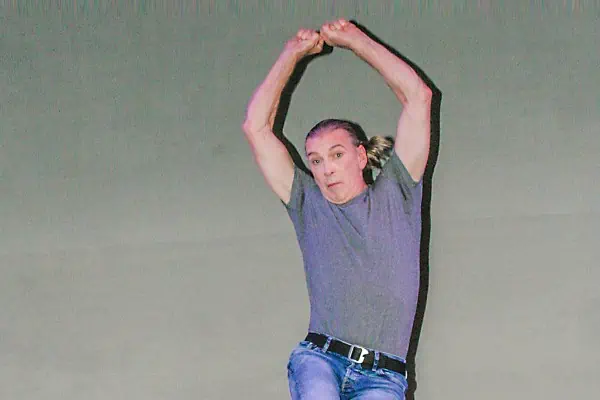When you think of the Greek philosopher, Plato – if you think of him at all – the expression “party animal” might not come to mind.
But Zuppa Theatre Co. would like to change that.
The Halifax-based troupe has taken one of Plato’s best-known works, The Symposium, and re-cast it as a modern party – a Pop-Up Love Party to be precise.
“The point of it is to take the basic arguments of The Symposium and translate them into contemporary terms,” says director Alex McLean.
Before you say, “OMG, what could be more boring than an evening of philosophy?” think again. For one thing, Plato’s classic was about a drinking party where a series of speakers held forth on the meaning of love, especially the brand of love known as Eros.
It’s also the origin of what we now call Platonic love, although that may not mean the non-physical variety you think it does.
“We’re speaking in the present day, in the present moment, to people who are actually in the room with us, so the audience is always the most important thing,” McLean says. “It was important that nobody was making stuff up, or saying things they didn’t believe. So all of the actors were basically paired with speeches from The Symposium that in some way they could relate to, and put into their own terms.”
For McLean and his co-artistic directors at Zuppa, Ben Stone and Susan Leblanc, the project began with a desire to do a show with Dartmouth-born Daniel Burns, a Michelin-starred chef who now works in New York City.
“The thing that was interesting to me about the idea of food in theatre was the way that food can kind of initiate a visceral experience,” McLean says. “Even the idea of food for thought, that food can be something intellectual, as well as physical.”
McLean had recently read a book about Plato, called The Drama of Ideas, which got him thinking about how The Symposium had combined the visceral with the intellectual.
“I really thought it would just be an inspiration, but the more we worked with it the more it seemed to catch on,” he says.
“What was interesting about The Symposium wasn’t just a few facets of it, but actually the whole dramatic structure of it. So then we just started improvising and building a show around it.”
After a lengthy period of development, what emerged was a 90-minute “show for five senses” that pits Stone, Leblanc and long-time artistic associate, Stewart Legere (who also wrote most of the show’s music) against each other in what McLean calls a game of one-upmanship.
“One person talks, then somebody tries to outdo them, then that person has a chance to follow up with a new argument,” he explains. “Everybody gets to do that, and then they share the final argument together.”
Sound designer and operator Brian Riley shares the actors’ space, essentially becoming a fourth player in the show, McLean adds.
Although the presentation often has a collaborative nature, the play is true to the original, in that there is always one person giving the speech.
“And they do happen in sequence, exactly as they happened in the Symposium. In fact, there’s even a point in The Symposium when Aristophanes gets hiccups and has to skip a turn, and that also happens in the show.”
As the three performers take on the seven arguments presented in Plato’s 2,300-year-old original, each speech is paired with a specific snack created by Burns and prepared by chef Denis Johnston.
“Each of these snacks is meant to basically translate the arguments that the actors are making into a sensory experience,” McLean says.
The presence of a cash bar in each venue adds to the party atmosphere.
“On top of that, the actors get to use all sorts of theatrical devices,” he adds. For example, the lawyer’s speech is staged as a kangaroo court.
“The audience actually gets to vote on propositions put forward to them and there are consequences to the actors based on how the audience vote.”
Similarly, the doctor’s speech about the body becomes a yoga routine the actors share with the audience.
“Everything is meant to take what is essential about those speeches and translate them into something that is theatrical and participatory. So it feels like you’re at a party, not a seminar.”
As for the notion of Platonic love as something non-physical, McLean says that may have been how Plato set it up in the second-last speech, delivered by Socrates.
But when a very drunk Alcibiades shows up at the party, “It suddenly becomes very bawdy, and all these embarrassing and sloppy things about love are reintroduced.”
The Pop-Up Love Party comes to Whitehorse this month for four showings as part of the Magnetic North Theatre Festival.
It will play from Monday, June 13 through Thursday, June 16 at the Miner’s Daughter lounge at 103 Main Street. The show includes a seven-course snack menu.
For more information, go to www.MagneticNorthFestival.ca.




